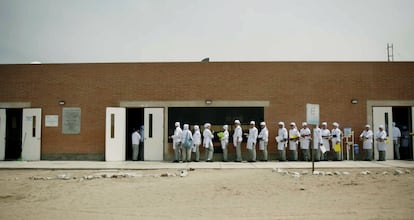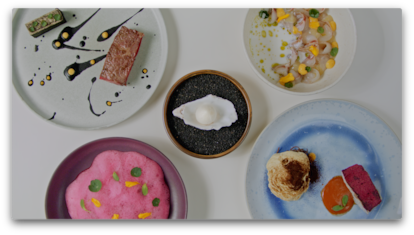‘Pachacútec,’ the story of a legendary Peruvian cooking school, premieres at the San Sebastián Film Festival
Founded by renowned chef Gastón Acurio in 2007, this school is located in a desert on the outskirts of Lima. It has trained more than 400 chefs from humble origins

For the past 16 years, a warehouse —located in a desert overlooking the sea, in a shantytown on the outskirts of Lima, Peru— has been converted into a kitchen, where several of the most promising Peruvian chefs of recent generations have gotten their start.
The Pachacútec Institute of Culinary Arts is —in the words of Joan Roca, the founder of El Celler de Can Roca, in Girona, Spain— an “oasis of culinary knowledge.” For the gastronomic critic Ignacio Medina, it’s “a laboratory.” And, for the famous Barcelona-based chef Albert Adriá, it’s “a great opportunity for hundreds of young people without resources.”
All of the aforementioned food experts have visited the school on the sandy beaches of Ventanilla, in the Peruvian province of Callao, getting the opportunity to tour the institute that was founded in 2007 by Gastón Acurio, the global ambassador of Peruvian cuisine.
Acurio, 55, had been thinking about bringing Pachacútec’s stories to the big screen for some time. But it wasn’t easy for the chef and restaurateur to choose someone who had the creative genius to direct and produce the project. It was only after watching an episode of the third season of the series Street Food: USA, in mid-2022, that he made up his mind. The director —the man behind the Miami episode— would be Mariano Carranza, a Peruvian living in the United States. He has significant experience in putting together diverse documentaries, dealing with wide-ranging subject matter, from a brain bank at Harvard University to the construction of a hand-woven rope bridge in the Andes.
While taking a look at a school where more than 400 chefs have been trained —who now work across the Americas, Europe and the Middle East —Carranza’s challenge was to summarize the spirit of Pachacútec in three representative cases. He interviewed more than 30 chefs and, after a couple of months of deliberation, he settled on Jhosmery Cáceres —the master pastry chef at La Mar, in San Francisco— Gerson Atalaya, head chef at Kay, a modernist restaurant that has revolutionized Luxembourg – and Alan Larrea, the owner of Percado, a ceviche bar that has refreshed the Lima scene.

The result is a 38-minute-long movie, filmed in four countries, which premiered at Spain’s San Sebastián Film Festival on Wednesday. It’s titled Pachacútec, the Improbable School. While it’s in the Culinary Cinema category, it’s not in competition for the award, due to its short duration. “In a country that prides itself so much on its gastronomy as a unifier, it’s necessary to put the lens on the people who have had an uphill climb. It should be noted that this school has been able to create opportunities for young people, who didn’t have the money to study cooking,” Carranza explains. The school —which receives more than 350 applications every six months— is only able to admit 25 people per semester.
Alan Larrea received one of those prized spots back in 2008. Living among ladles, knives and cutting boards wasn’t exactly his first choice: in fact, he had a sexist view of the matter, thinking that cooking was for women. He thought that they were the ones who had to shed tears while chopping garlic and red onion —key ingredients in Peruvian cuisine— and have the food hot and ready for when the man came home.
This mindset was shaken up when he was 17. His mother died of leukemia and his father lost his job. While looking for ways to help out at home, his first work experience came to him on a platter: washing dishes in his aunt’s modest restaurant. A spark was lit. In one year, Larrea went from being a dishwasher to kitchen assistant. His voracious curiosity didn’t stop —he began devouring second-hand cookbooks and watching cooking shows on TV.
Years later —after caring for the elderly, walking dogs and collecting fares on public transportation— he learned about the Pachacútec school, while flipping through a magazine in a barbershop. Being admitted, he recalls, was like getting out of a hole and finally seeing a less bleak horizon.

“They taught me the techniques and language of cooking. But, in Pachacútec, above all, they taught me how to be a person. To be supportive, honest and responsible,” Alan Larrea tells EL PAÍS, before taking his flight to Spain. He attended the documentary’s premier at the San Sebastián Film Festival, along with Jhosmery Cáceres and Gerson Atalaya. The three protagonists also faced a challenge following the filming: cooking dinner for 80 guests at the Basque Culinary Center, the prestigious institution dedicated to research and innovation in gastronomy. “It’s a dream to be able to cook on the same stage as [the Argentine] Narda Lepes, one of my greatest references,” Larriera smiles. He’s come a long way from paying his tuition by spending his early mornings working as a gardener at the Pachacútec Institute. Today, at 42, he runs his own restaurant.
Similarly, Jhosmery Cáceres’s first experience in the kitchen didn’t involve caramelizing fruit or preparing a fondant to decorate a cake. It was, rather, supporting a family enterprise: an on-the-go ceviche cart. Like her companions from Pachacútec, life wasn’t kind to her. Jhosmery’s mother managed to cover the family’s three meals a day with just 25 soles ($7). She always says that Pachacutec not only changed her life, but also her mother’s. “It was my lifeboat. I wouldn’t have gotten to where I am if they hadn’t extended their hand to me,” Cáceres sighs in the film. This girl —with straight black hair and thick glasses— ended up leaning towards pastry-making, given her talent for accuracy. “If you follow the rules, everything will be fine. Salty food is more unpredictable.”
Gerson Atalaya —who will celebrate five years in Luxembourg this December— sees cooking as an act of love, but also as a chance to break the rules. He found that gastronomy in the European country of fairy tales wasn’t magical enough —it was rather stuffy and classic. Atalaya —who, before putting on his apron, sings a hip hop song— feels that his Kay restaurant is a way of getting out of the box. “It’s like freestyle. You can express your feelings on a plate [without limits]. Cooking with love is important, but it’s more important to cook with personality,” he affirms.
Co-produced by Gastón Acurio and Irzio Pinasco, Pachacútec, the Improbable School aims to continue its journey through festivals and movie theaters. San Sebastián is just the first stop. Showing the school in the desert of Ventanilla is a must. Let the pots and pans ring.
Sign up for our weekly newsletter to get more English-language news coverage from EL PAÍS USA Edition
Tu suscripción se está usando en otro dispositivo
¿Quieres añadir otro usuario a tu suscripción?
Si continúas leyendo en este dispositivo, no se podrá leer en el otro.
FlechaTu suscripción se está usando en otro dispositivo y solo puedes acceder a EL PAÍS desde un dispositivo a la vez.
Si quieres compartir tu cuenta, cambia tu suscripción a la modalidad Premium, así podrás añadir otro usuario. Cada uno accederá con su propia cuenta de email, lo que os permitirá personalizar vuestra experiencia en EL PAÍS.
¿Tienes una suscripción de empresa? Accede aquí para contratar más cuentas.
En el caso de no saber quién está usando tu cuenta, te recomendamos cambiar tu contraseña aquí.
Si decides continuar compartiendo tu cuenta, este mensaje se mostrará en tu dispositivo y en el de la otra persona que está usando tu cuenta de forma indefinida, afectando a tu experiencia de lectura. Puedes consultar aquí los términos y condiciones de la suscripción digital.









































